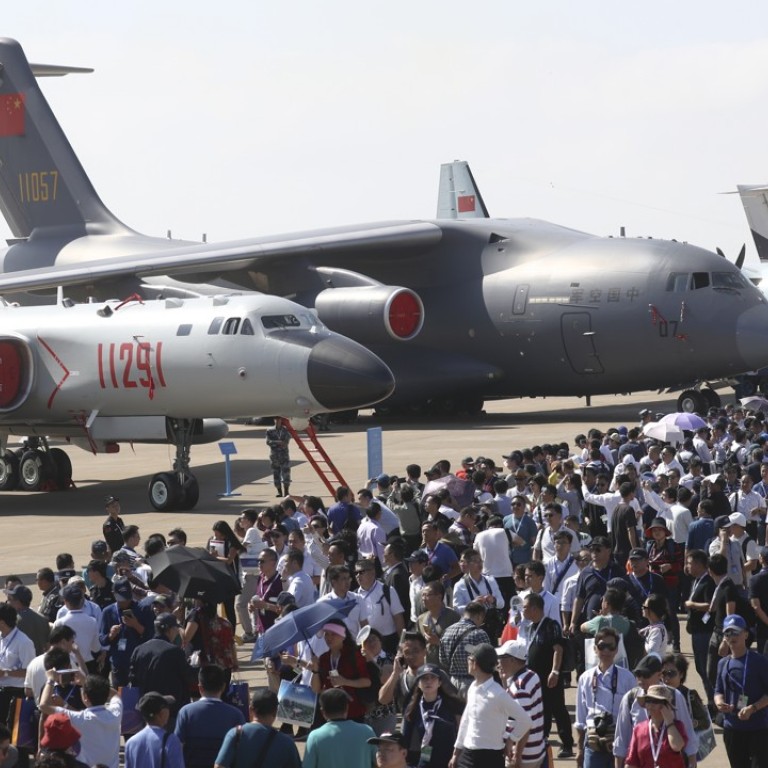
US-China trade war causing ‘psychological uncertainty’ among Airbus partners, customers in China
- Prolonged dispute will affect China’s aviation growth, says head of Airbus in China
- Boeing’s top official in China say that his company has been urging the US government to find a solution to the trade war
The US-China trade war has caused quite a “lot of psychological uncertainty” among European aircraft maker Airbus’ Chinese partners and customers regarding their expectations for the country’s aviation industry, a top official said on Tuesday.
“This will have a negative impact on China’s aviation growth,” Xu Gang, chief executive of Airbus China, told a press briefing at the biennial Airshow China in the southern coastal city of Zhuhai. “Nobody will be the winner of this kind of trade war.”
Why China is no closer to rivalling Boeing or Airbus
China’s air travel market, which has enjoyed double-digit annual growth over the past few years, is set to overtake the US to become the world’s largest in terms of passengers in the next two decades, according to Airbus and its US rival Boeing, which dominate the large aircraft segment.
Boeing estimates the Chinese market for civilian aircraft to reach 7,690 jets worth US$1.2 trillion over the next two decades.
But the escalating trade war between the world’s largest two economiesand China’s slowing economy has sparked concerns over such rosy outlook.
Passenger jets, America’s largest category of exports to China last year at US$16.3 billion, have not yet been hit by tariffs levied by Beijing.
China has ambitions to supply one tenth of the domestic commercial aircraft market with planes made by it own companies by 2025 as part of the “Made in China 2025” plan, which has drawn the ire of US President Donald Trump and consequently added fuel to the trade tensions.
Xu said most of China’s growth in aviation was a result of the expanding middle class, who would suffer from rising unemployment and reduced international commercial ties should the current trade war intensify.
The aviation market is “one of the few Chinese industries where the demand is greater than supply”, and less than 1 per cent of the 550 million flights made by Chinese last year were international, reflecting great potential in the market, he added.
Airbus and Boeing hide identity of US$35.4 billion Chinese buyers as trade war creates minefield for international companies
France-headquartered Airbus has forecast that its fleet in China – its biggest market – will expand to 3,000 by the end of 2025 from the current 1,736.
Xu said that Airbus will raise the production capacity of the A320 single-aisle aircraft from four to six a month at its Tianjin plant, adding that the company wants it to become its Asia manufacturing centre.
Its arch-rival Boeing, on the other hand, said in a separate briefing that deliveries of new planes to Chinese airlines had not been affected by the trade war.
Boeing has a lot to lose in China as Trump and Xi fire the first salvos of their trade conflict
The Chicago-based aerospace giant is on track to surpass its record deliveries of 201 planes in 2017, having already delivered 153 aircraft to Chinese customers in the first three quarters of this year.
“We continue to engage with US government officials and to urge for productive conversations,” said John Bruns, chief executive of Boeing China. “We are optimistic for a quick resolution.”
Boeing will deliver its 2,000th plane to a Chinese carrier by the end of this month, he said.
Both companies also highlighted their determination to strengthen partnerships with Chinese suppliers, research institutes and other industry players.
Boeing has added five new Chinese suppliers who provide parts from aluminium plates to plane seats for its single-aisle 737 model.
Its 737 completion centre, jointly established with the state-owned Commercial Aircraft Corporation of China, will deliver the first plane by the end of December.

